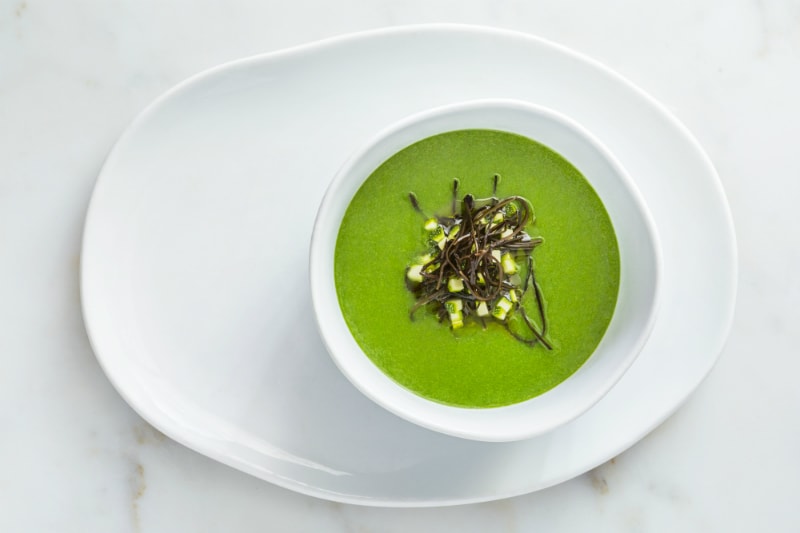You are what you eat, the old adage goes, but it’s only been in the last few years that science has revealed the extent to which this is true. The personalised aspect of nutrition—there’s no one-size-fits-all diet, which is why there’s so much debate over the pros and cons of diets like Atkins and Keto—has been a major wellness trend this year, though perhaps one of the most interesting revelations in the last couple of years has been the connection between the mind and the gut. As COMO Hotels and Resorts’ nutritional consultant, Eve Persak knows that the science of nutrition is a field where new things are being discovered every day, and the mind-gut relationship has revealed how important what we eat is to how we think, feel and perceive the world. A certified nutrition support clinician and registered dietitian, Eve has dedicated her career to helping clients redefine their wellbeing, spending over seven years at COMO Shambhala Estate in Bali and now continues to oversee nutrition at COMO Hotels & Resorts. Compare Retreats sat down with Eve to talk about everything from gut health and ‘the second brain’ to the misinformation on detoxing.

For anyone who isn’t sure: what exactly does gut health refer to? The gut is often interpreted as the stomach, but when we talk about ‘gut health’, from a clinical standpoint, it’s really the health of the whole digestive tract. A common misunderstanding is that the gut is a part of our body, like an internal organ, but the gastrointestinal tract is more like a tube that moves things from outside to the inside of the body. So gut health refers to how well things move through that tube as well as how effective the digestive system and accessory organs are in breaking down food material.
See also: Private Pools and Personalised Programmes at COMO Shambhala Estate
What makes gut health so important to talk about? There’s been a lot of concern surrounding gut health as well as environmental and evolutionary factors that have disrupted things. We used to think that food was the only thing affecting our gut health. Now, we understand that there are hormonal and microbial elements as well as biochemical and neurological phenomenons such as neuropeptides which affect our gut health. Environmental causes like the pollutants in the air, car exhaust and the chemicals in cleaning products also tied into the equation in terms of the overall health of the gut.
Even things like stress: the stress response used to be something that was temporary, quick to rise and quick to resolve. Now it’s become almost like a baseline, an undercurrent of the way we move through our day. Our body is so highly integrated that feelings of stress can manifest itself in the way we cope, the way we eat, and how we process our food.

What are some of the signs of an unhealthy gut to look out for? The obvious one would be irregularities. Unfortunately, the understanding of ‘regularities’ is also very ambiguous. If you look at it from a medical perspective, surprisingly you’ll find that there’s a far greater range that clinicians consider acceptable. Signs of an unhealthy gut can crop up anywhere: I often find that while it’s not an actual, site-specific, local gastrointestinal symptom, oftentimes, signs of an unhealthy gut can be ones that are outside of the GI tract. The role of the gut is often overlooked when treating skin problems, mood disorders or chronic conditions.
See also: Retreat Recipes: COMO Shambhala’s Chilled Green Goddess Soup
How does the gut, or the ‘second brain’ as it’s been called, play into mental health? I could speak for hours on this. Something as simple as your level of sugar intake shows you that what you eat translates to what happens in the brain. High levels of sugar intake have the same pro-inflammatory effect on brain tissue as it does on cardiovascular tissues. So in terms of long-term health, there’s a correlation between how much sugar we consume and the risk of chronic brain disorders such as Alzheimer’s or Parkinson’s Disease.
Surrounding our GI tract are also these receptors we call gut neuropeptides that communicate directly with the brain. Our digestive system recognises certain molecules in our diet and gut neuropeptides send messages to the brain. It influences our mood, our memory and even our capacity to focus. This is why I think the topic of gut health tends to be so attractive with a corporate crowd. What they’re eating for breakfast, can actually make them more creative or even just gather their thoughts and focus better in the board room, you know? And for their kids, it’s about what they retain in class and what they’re meant to absorb.
Is sugar really the worst thing to happen to our diet? What are the implications of having too much? That’s a great question. I think the message that we should avoid all sugars needs some clarification. Our body breaks down carbohydrates into sugar, so no matter what carbohydrates you consume, like greens, it will be broken down into glucose for you and the same goes for a spoon of refined sugar. When it goes into the body it gets broken down into the same molecule so it’s just about being mindful of which sugars you consume and within what context you have them.
What I’d recommend to athletes won’t apply to someone with regular levels of activity. Athletes competing in an event need sugar in its refined form for it to be delivered to fuel the muscles immediately so I would recommend them high sugar foods or even straight-sugared beverages. Fresh fruit is great and its phytochemicals and fibres are great for the gums but the sugar we get from high fructose corn syrup just isn’t the same thing. It’s all about being judicious.

So health trends such as drinking Komboucha or taking apple cider vinegar shots: are these as good for gut health as the trends say? Again, it depends. That’s my answer for everything. Apple cider vinegar has been said to be helpful in many ways, such as controlling appetite, but the research isn’t strong and its usefulness varies depending on the person. For starters, I wouldn’t recommend it to somebody who has had reflux. You’re introducing an acid to the stomach, which would be damaging if you have stomach inflammation, so again it’s about being judicious. The same thing with Komboucha: certain bacteria can be helpful but there are strains that aren’t well suited for somebody with a dysbiosis happening. With probiotic supplements as well, I tend to be very targeted with the amounts I prescribe. Everyone’s just throwing probiotics at themselves with high potencies, which is not always necessary or appropriate.
See also: 7 Healthy Holiday Eating Hacks From A Registered Dietician
How beneficial are detoxes and cleanses? There’s a lot we can do to stimulate the body’s detoxification system, but not they’re not always appropriate for everyone. We might look at a cleanse or detox as a way of cleansing the body but the body is designed to do that on its own. Doing a detox or cleanse is a way of supporting the body’s function to do that and there’s really not a need to be extremely restrictive. Deprivation can be equally as damaging as excess. The body’s brilliant at what it does. Sometimes it just needs a little help and a nudge; it doesn’t need a kick in the bottom.
What are some treatments at COMO Resorts & Hotel that can help improve our gut health? COMO has been really great in aligning themselves with experts who specialise in things such as abdominal massages. Lisa Levine’s a practitioner at COMO trained in Arvigo Mayon abdominal massage techniques. Like our shoulders or chest, we carry so much tension in the muscles around or digestive tract. Things like abdominal messages and belly breathing help in restoring the muscles’ integrity.



